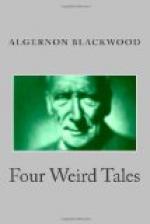“And you found—” he began stammering, looking hard at the other’s dreadfully altered face, from which every line of hope and cheerfulness seemed to have been obliterated as a sponge wipes markings from a slate—“you found—”
“I found,” replied the other, in a solemn voice, and it was the voice of the mystic rather than the man of science—“I found what I went to seek. The vision never once failed me. It led me straight to the place like a star in the heavens. I found—the Tablets of the Gods.”
Dr. Laidlaw caught his breath, and steadied himself on the back of a chair. The words fell like particles of ice upon his heart. For the first time the professor had uttered the well-known phrase without the glow of light and wonder in his face that always accompanied it.
“You have—brought them?” he faltered.
“I have brought them home,” said the other, in a voice with a ring like iron; “and I have—deciphered them.”
Profound despair, the bloom of outer darkness, the dead sound of a hopeless soul freezing in the utter cold of space seemed to fill in the pauses between the brief sentences. A silence followed, during which Dr. Laidlaw saw nothing but the white face before him alternately fade and return. And it was like the face of a dead man.
“They are, alas, indestructible,” he heard the voice continue, with its even, metallic ring.
“Indestructible,” Laidlaw repeated mechanically, hardly knowing what he was saying.
Again a silence of several minutes passed, during which, with a creeping cold about his heart, he stood and stared into the eyes of the man he had known and loved so long—aye, and worshipped, too; the man who had first opened his own eyes when they were blind, and had led him to the gates of knowledge, and no little distance along the difficult path beyond; the man who, in another direction, had passed on the strength of his faith into the hearts of thousands by his books.
“I may see them?” he asked at last, in a low voice he hardly recognized as his own. “You will let me know—their message?”
Professor Ebor kept his eyes fixedly upon his assistant’s face as he answered, with a smile that was more like the grin of death than a living human smile.
“When I am gone,” he whispered; “when I have passed away. Then you shall find them and read the translation I have made. And then, too, in your turn, you must try, with the latest resources of science at your disposal to aid you, to compass their utter destruction.” He paused a moment, and his face grew pale as the face of a corpse. “Until that time,” he added presently, without looking up, “I must ask you not to refer to the subject again—and to keep my confidence meanwhile—ab—so—lute—ly.”
3




